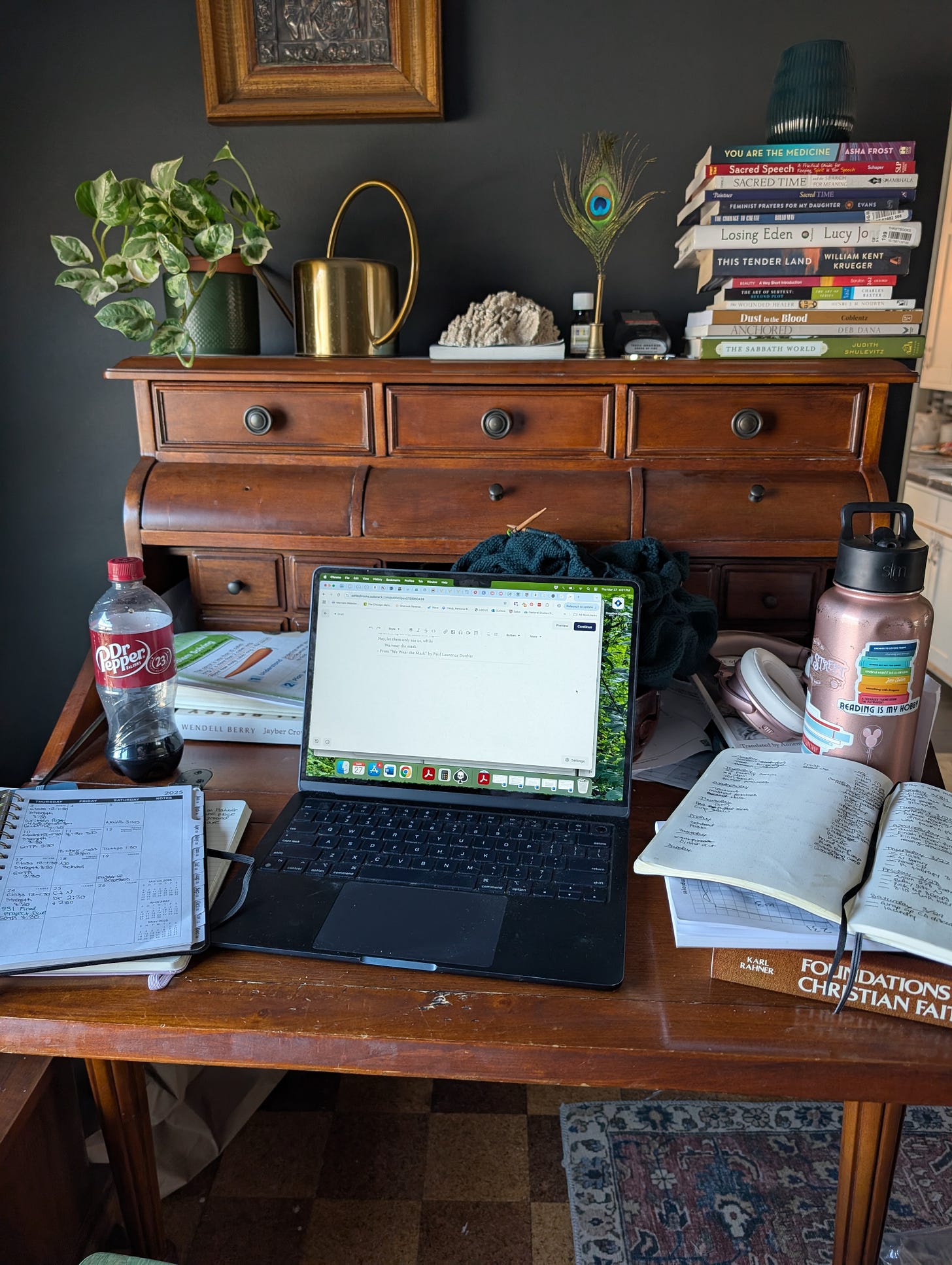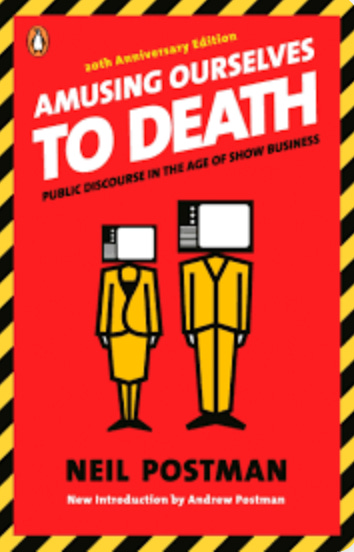What I Read in March
A classic, two non-fictions worth your time, and yet another Brandon Sanderson. (Plus, the middle-grade that's driving me nuts.)
Things I’ve been thinking about:
How to keep my dogs out of the garden this year
Did those irises the neighbors gave me actually survive the winter?
Self-actualization as a way of meeting God
Can other people ever really know us? (Can we ever really know ourselves?)
Are my kids going to break an arm playing on the neighbor’s hoverboard?
Grace, politics, and the anonymous Christian
How much I love the library
How my reading life is too often determined by the library hold list instead of my own overflowing bookshelves
Lent, sacrifice, suffering
Spring, sunshine, cheap vintage art from Goodwill
The astronomical number of notebooks on my desk that all serve an actual purpose (is six too many to have in rotation?)

That sums up my brain not over the entire month of March but over the last five minutes or so. Spring has sprung, theology courses are fruitful and a lot of work, kids continue to be kids, and Lent is the grounding backdrop of it all.
I hate to say I didn’t read much in March because I think I’ve read more this month than any other time since I was an undergrad English major, but I didn’t read much outside of assignments. This is what I’ve got.
Edgedancer by Brandon Sanderson
I was honestly planning to take a break from Sanderson for a while. I have the rest of the Stormlight Archive already downloaded from Libro.fm (a great alternative for audiobooks that support indie bookstores rather than Audible/Amazon), but I didn’t want to spend the credits on this short novella that was next in the series. Then the library deities gifted me with a Lucky Day copy on Libby about six weeks earlier than expected!
Edgedancer is technically optional to the series, but I knew it offered backstory for a character that would be important later. Definitely not the best thing I’ve ever read (actually, it might be one of my least favorite Sanderson books), but I’m glad to have further context for when I pick up the rest of the series down the road.
Amusing Ourselves to Death: Public Discourse in the Age of Show Business by Neil Postman
I picked up this book based on a recommendation from someone I follow on Instagram, not realizing until I read the foreword that it was written 40 years ago. Postman was certainly prescient! He points to the rise of “entertainment media,” specifically news TV, and the decline of print media as a harbinger of a Huxley-esque society in which everyone falls prey to their love of distraction and willingly gives up their ability for critical thinking.
I mean, look around. The man wasn’t wrong.
What I most appreciate about Postman’s argument is that he recognized “junk TV” (and presumably the equivalent modern medias) as having its place. Where we need caution is when it comes to things like politics, academia, education, medical information, and so on. Should we be getting our news in soundbites, from news anchors and influencers and celebrity podcasters? Or should we pick up a local newspaper, physically or digitally? The emphasis on visual media—I would say especially the lightning-fast Instagram reels and YouTube shorts we’re faced with today—has eroded our attention spans and our ability to think deeply and absorb information.
Postman didn’t really tell me anything I didn’t already know, but he did provide an interesting theory for how we got here—one made even more fascinating because he was predicting the future rather than reflecting on the past.
On Tyranny by Timothy Snyder
I don’t remember where I heard about this book, but I remember looking it up and thinking, “That sounds like something I should read right about now.” (Me and one hundred other library patrons! But the queue went quickly.) Published in 2017, On Tyranny explores the events of the twentieth century to determine how authoritarian governments take hold and how to resist them.
I brought it to a coffee shop and read the whole thing in one sitting while my kids played chess and drank smoothies. Snyder, a professor of history at Yale and an expert on WWII, presents practical ideas for what the heck to do now that are grounded in history and logic. I would call it required reading for informed Americans. These are the lessons I’ve been thinking about most:
Defend institutions
Stand out
Believe in truth
Make eye contact and small talk
Establish a private life
Pride and Prejudice by Jane Austen
One of my reading goals this year is to actually start reading through the beautiful Drop Cap series my husband gifted me years ago. I’ve read Pride and Prejudice before, but when I realized it had been about 15 years, I decided to make it the first book of my Drop Cap reading. (Although I’m not planning to read them all in order, I suppose it doesn’t hurt to start with A.)
I’m not the least bit surprised that it holds up just as well as I remembered. I know I shouldn’t have been worried, but I was. The 2005 movie is deeply engrained in my soul, and last fall I watched the BBC version for the first time. I’ve read countless adaptations and even saw a stage play a few years back. I knew the story was delightful, but I was concerned the writing would somehow let me down.
I was being ridiculous, of course. If anything, the writing felt even snappier and full of wit than I remembered. If it’s been a while since you’ve revisited an old favorite, let this be your sign to make your way back to it.
Pride and Prejudice (Awesomely Austen series), adapted by Katherine Woodfine
We happened to have this young adult version of P&P sitting on our shelves thanks to my lovely cousin, who gifted it to us when she cleaned out her classroom a few years ago. My oldest girls (10 and 8) were interested, so I turned it into a buddy read.
Austen’s chapters in the original aren’t terribly long, and this version makes them even shorter, putting them in the perfect read-aloud range. Most of the dialogue is straight from Austen herself, with some adjustments to the surrounding text to offer younger readers more context clues. There’s also a handy illustrated character list at the beginning, which has helped the kids keep track of everyone.
This has been such a fun first Austen experience for the kids! We’re going to watch both movie versions when we’re done so they can vote on which one they prefer. We also have Emma and Sense and Sensibility waiting in the wings if they decide they want to continue on with dear Jane’s works.
The Mysterious Benedict Society by Trenton Lee Stewart
We started this book as a read-aloud with the 10- and 8-year-olds in November when I grabbed it from a book fair for just $3. Five months later, I have finally admitted defeat and told them to finish it themselves. (Which they plan to.)
This book started out so well. There were riddles and puzzles and intrigue about who Mr. Benedict was and what exactly was going on! But once our four main characters make it into the heart of their mission, the story stalled out. It’s almost 500 pages long—and not short pages, either! It could have been at least 150 pages shorter without losing much of the plot, or so I’ve gathered since I skimmed the ending to finally find out what the heck happens.
This is only my opinion of course; this book gets amazing reviews from tons of readers and teachers. My own kids want to see how it wraps up, so they’ll probably finish it on their own. Maybe it would have been better as an audiobook, but I found it incredibly tedious to read aloud myself.
Which books have captured your attention lately?
As we move from winter into spring (slowly here in Minnesota, as we’re currently getting yet another accumulating snowfall), I’m sending you a blessing: may you let go of what you can’t control, and hold firmly and with tenderness to truth and love.










Complete same experience with the Mysterious Benedict Society. I've always assumed there must be something wrong with me because I can never get into it. I've tried for years!
I zipped through This Time Tomorrow and enjoyed it. It reads like a YA book but for me.
I'm currently reading Just Kids by Patti Smith and I have lots of thoughts.
So glad P&P held up for you! I think that book is just so smart. And good tip on the early reader version. ;)
I read Postman's Amusing Ourselves To Death a few years ago and had the same reaction. It's like he predicted the internet and the harm it would cause. Nevermind the fact at least with cable news we were all watching the same version of entertainment... now it's so algorithmically tailored to each person that we basically all live in separate universes. Sigh.